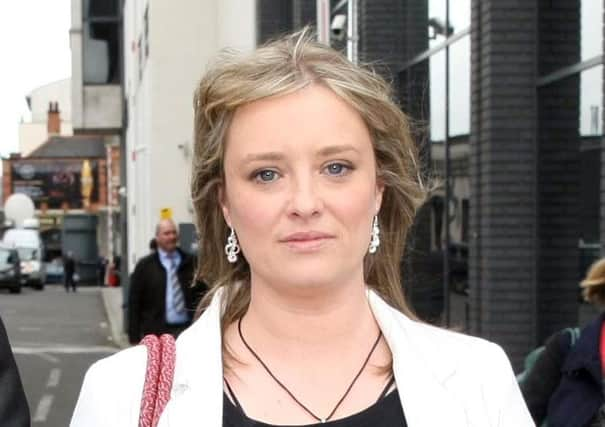Guardian’s Roy Greenslade apology for Mairia Cahill


In response to the documentary, which also broadcast Ms Cahill’s claims that she was subjected to “interrogation” by senior IRA figures when she complained, Greenslade wrote that the programme-makers “were too willing to accept Cahill’s story and did not point to countervailing evidence”.
He said: “This lack of balance resulted in the Cahill story being accepted at face value across Ireland, where [Gerry] Adams and his party were forced on to the back foot as they tried to defend and explain the IRA’s actions.”
Advertisement
Hide AdAdvertisement
Hide AdThe Guardian’s apology comes after the former columnist and university lecturer on media ethics revealed last week that he viewed himself as a “messenger” who backed the republican cause, and said: “I wanted peace and played a very minor role as a messenger at a crucial moment during the process itself. But I understand why the conflict occurred and do not regret my support for those who fought it. I am pleased at last to come out from hiding and explain myself to everyone”.
Greenslade admitted having secretly written material backing the republican movement, under false names, while also writing for mainstream media publications.
In a British Journalism Review he said: “I cannot say for sure when I started to write for the republican paper, An Phoblacht. My contributions, some of them under the George King pseudonym, some unattributed, were irregular.”
Earlier this week the Chartered Institute of Journalists issued a scatching rebuke, saying: “We have to emphasise that it is professionally incompatible for any journalist, let alone a national newspaper editor and professor of journalism ethics, to lead a double life of propagandising one side in any armed conflict with a fake identity while at the same time working for news publishers seeking to report on it.
Advertisement
Hide AdAdvertisement
Hide Ad“A journalist cannot and should not be a double-agent for any government or paramilitary group using violence to further their political ends.”
On Friday afternoon the Guardian attached a notice to the online version of the 2014 article, confirming the newspaper has now apologised to Ms Cahill.
It said: “Columnists are hired for their opinions but the readers’ editor considered that here the writer’s political position should have been indicated openly. The lack of disclosure was especially unfair to a vulnerable individual, and the Guardian has now apologised to Ms Cahill.”
On Tuesday, a spokesperson for the Guardian said: “The Guardian’s independent readers’ editor has received a complaint from Mairia Cahill and is investigating this issue.
Advertisement
Hide AdAdvertisement
Hide Ad“The readers’ editor will also be reviewing other historical Roy Greenslade articles concerning Northern Ireland, to ensure that they meet the Guardian’s editorial standards and are sufficiently transparent.”
Speaking to the News Letter on Tuesday, Ms Cahill said: “He should now publish every single thing that he wrote [under a pseudonym]. Interestingly, An Phoblacht has not included the ‘George King’ articles in their archive. In what way was he a messenger? Was his role to put things out on behalf of Sinn Fein and the IRA?
“Did someone from Sinn Fein or the IRA approach Greenslade to write that [2014] piece for the Guardian?
Asked by Press Gazette whether his views on terrorism disqualified him from teaching ethics, Greenslade said: “The furore underlines the main point of my article: to have come clean in the 1970s with my beliefs would have rendered me unemployable.
Advertisement
Hide AdAdvertisement
Hide Ad“I did nothing more than the scores of journalists who keep their political views to themselves. My opinions did not affect my journalistic work, nor did they affect my university teaching”.
In a footnote now attached to the original online article, the Guardian states: “After concerns raised by a reader following publication of this article in 2014 that Roy Greenslade had not disclosed his Sinn Féin sympathies, he started to declare his writing during the 1980s for the party’s newspaper, An Phoblacht, including at the end of two more blogs relating to Ms Cahill.
“He now says he regrets that he did not add it retrospectively to this piece and offers his ‘sincere apology for failing to disclose my own interests’”.
Advertisement
Hide AdAdvertisement
Hide AdA message from the Editor:
Thank you for reading this story on our website. While I have your attention, I also have an important request to make of you.
With the coronavirus lockdown having a major impact on many of our advertisers — and consequently the revenue we receive — we are more reliant than ever on you taking out a digital subscription.
Subscribe to newsletter.co.uk and enjoy unlimited access to the best Northern Ireland and UK news and information online and on our app. With a digital subscription, you can read more than 5 articles, see fewer ads, enjoy faster load times, and get access to exclusive newsletters and content. Visit https://www.newsletter.co.uk/subscriptions now to sign up.
Advertisement
Hide AdAdvertisement
Hide AdOur journalism costs money and we rely on advertising, print and digital revenues to help to support them. By supporting us, we are able to support you in providing trusted, fact-checked content for this website.
Alistair Bushe
Editor